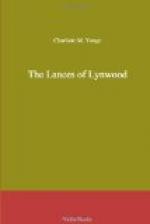No less than two months was he obliged to wait, during which both he and Gaston chafed grievously under their forced captivity; but at length he learnt that a band of Free Companions had arrived at Rennes, on their way to offer their service to the Prince of Wales; accordingly he set forth, and after some interval found himself once more in the domains of the house of Plantagenet.
It was late in the evening when he rode through the gates of Bordeaux, and sought the abode of the good old Gascon merchant, where he had always lodged. He met with a ready welcome, and inquiring into the most recent news of the town, learnt that the Prince was considered to be slightly improved in health; but that no word was spoken of the army taking the field, and the war was chiefly carried on by the siege of Castles. He asked for Sir John Chandos, and was told that high words had passed between him and the Prince respecting a hearth-tax, and that since he had returned to his government, and seldom or never appeared at the council board. It was the Earl of Pembroke who was all-powerful there. And here the old Gascon wandered into lamentable complaints of the aforesaid hearth-tax, from which Eustace could scarcely recall him to answer whether the English Baron de Clarenham had arrived at Bordeaux. He had come, and with as splendid a train as ever was beheld, and was in high favour at court.
This was no pleasing intelligence, but Eustace determined to go the next day to present his nephew to the Prince immediately after the noontide meal, when it was the wont of the Plantagenet Princes to throw their halls open to their subjects.
Accordingly, leading Arthur by the hand, and attended by Gaston, he made his appearance in the hall just as the banquet was concluded, but ere the Knights had dispersed. Many well-known faces were there, but as he advanced up the space between the two long tables, he was amazed at meeting scarce one friendly glance of recognition; some looked unwilling to seem to know him, and returned his salutation with distant coldness; others gazed at the window, or were intent on their wine, and of these was Leonard Ashton, whom to his surprise he saw seated among the Knights.
Thus he passed on until he had nearly reached the dais where dined the Prince and the personages of the most exalted rank. Here he paused as his anxious gaze fell upon the Prince, and marked his countenance and mien—alas! how changed! He sat in his richly-carved chair, wrapped in a velvet mantle, which, even on that bright day of a southern spring, he drew closer round him with a shuddering chilliness. His elbow rested on the arm of his chair, and his wasted cheek leant on his hand—the long thin fingers of which showed white and transparent as a lady’s; his eyes were bent on the ground, and a look of suffering or of moody thought hung over the whole of that face, once full of free and open cheerfulness. Tears filled Eustace’s eyes as he beheld that wreck of manhood and thought of that bright day of hope and gladness when his brother had presented him to the Prince.




